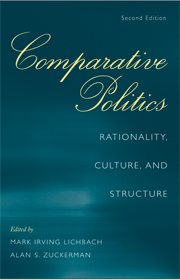Book contents
- Frontmatter
- Contents
- Contributors
- Preface and Acknowledgments
- 1 PARADIGMS AND PRAGMATISM
- 2 THINKING AND WORKING IN THE MIDST OF THINGS
- 3 ADVANCING EXPLANATION IN COMPARATIVE POLITICS
- 4 STRONG THEORY, COMPLEX HISTORY
- 5 RECONSIDERATIONS OF RATIONAL CHOICE IN COMPARATIVE AND HISTORICAL ANALYSIS
- 6 CULTURE IN COMPARATIVE POLITICAL ANALYSIS
- 7 RESEARCHING THE STATE
- 8 AN APPROACH TO COMPARATIVE ANALYSIS OR A SUBFIELD WITHIN A SUBFIELD?
- 9 THE GLOBAL CONTEXT OF COMPARATIVE POLITICS
- 10 COMPARATIVE PERSPECTIVES ON CONTENTIOUS POLITICS
- 11 CITIZENSHIP IN DEMOCRATIC POLITICS
- 12 NESTED CITIZENS
- 13 BACK TO THE FUTURE
- 14 THE COMPARATIVE POLITICAL ECONOMY OF THE WELFARE STATE
- 15 MAKING CAUSAL CLAIMS ABOUT THE EFFECT OF “ETHNICITY”
- References
- Author Index
- Subject Index
- Titles in the series
1 - PARADIGMS AND PRAGMATISM
COMPARATIVE POLITICS DURING THE PAST DECADE
Published online by Cambridge University Press: 05 June 2012
- Frontmatter
- Contents
- Contributors
- Preface and Acknowledgments
- 1 PARADIGMS AND PRAGMATISM
- 2 THINKING AND WORKING IN THE MIDST OF THINGS
- 3 ADVANCING EXPLANATION IN COMPARATIVE POLITICS
- 4 STRONG THEORY, COMPLEX HISTORY
- 5 RECONSIDERATIONS OF RATIONAL CHOICE IN COMPARATIVE AND HISTORICAL ANALYSIS
- 6 CULTURE IN COMPARATIVE POLITICAL ANALYSIS
- 7 RESEARCHING THE STATE
- 8 AN APPROACH TO COMPARATIVE ANALYSIS OR A SUBFIELD WITHIN A SUBFIELD?
- 9 THE GLOBAL CONTEXT OF COMPARATIVE POLITICS
- 10 COMPARATIVE PERSPECTIVES ON CONTENTIOUS POLITICS
- 11 CITIZENSHIP IN DEMOCRATIC POLITICS
- 12 NESTED CITIZENS
- 13 BACK TO THE FUTURE
- 14 THE COMPARATIVE POLITICAL ECONOMY OF THE WELFARE STATE
- 15 MAKING CAUSAL CLAIMS ABOUT THE EFFECT OF “ETHNICITY”
- References
- Author Index
- Subject Index
- Titles in the series
Summary
INTRODUCTION
Students of comparative politics explain electoral behavior, political networks, political institutions, contentious politics, comparative political economies, welfare states, international-comparative linkages, and the state. Their interest in the pragmatic and causal analysis of these critical political questions defines the “messy center” of comparative politics. The first edition of this volume emphasized the field's research paradigms, placing rationality, culture, and structure in the subtitle. In the decade or so since the first edition was published, tension between these two perspectives on the field has persisted. Contrasts between research paradigms and pragmatic causal accounts provide the intellectual friction that drives much of our research. These alternative foci structure this edition's themes and problems.
Aiming to transcend a battle of the paradigms, Alan Zuckerman's chapter advances an explanatory strategy that is one such way forward. Explanations in comparative politics, he maintains, must meet clear standards: The more that are met, the better the results. The criteria include social mechanisms (a particular form of causal mechanism) that are derived from strong theoretical propositions. Convincing explanations also require empirical evidence of the specified explanatory processes. Because the ontology of politics demands that the explanations apply to stochastic, multilevel, and endogenous phenomena, simple causal claims are insufficient.
Applying social mechanisms with high prior probabilities of explanatory power and employing appropriate statistical techniques transforms the language of explanation from imprecise verbal accounts into clear and specific arguments. The results move explanation along a scale from the mistaken to the demonstrated.
- Type
- Chapter
- Information
- Comparative PoliticsRationality, Culture, and Structure, pp. 1 - 17Publisher: Cambridge University PressPrint publication year: 2009
- 1
- Cited by

